abstract
One of the key issues in higher degree performance-as-research projects is the nature of academic writing itself – as a major mode of 'documentation' of research practices – and how to acquire it if you have been trained in performance-making rather than writing-productive practices. My first point today relates to the question of mastering research-writing register/s in the context of expert practices. A second key issue concerns the status of expert performance-making practices in that same higher degree context. In arguing that, within the university context, we might usefully approach these as epistemic practices, which operate in terms of a range of different imperatives, I am attempting to signal that the tenacious old "theory vs practice" divide is non-productive – and avoidable – in practice-as-research contexts. But we need to begin saying so, providing the appropriate argument. My third point will be that we need to begin to identify, in writing, how expert practitioners work, as distinct from producing spectator-based interpretations of that work. I am proposing that expert performance-making practices tend to work, to a significant degree, at a particular interface, where the operations of expert intuition meet the operations specific to the logics of performance-production.
Introduction
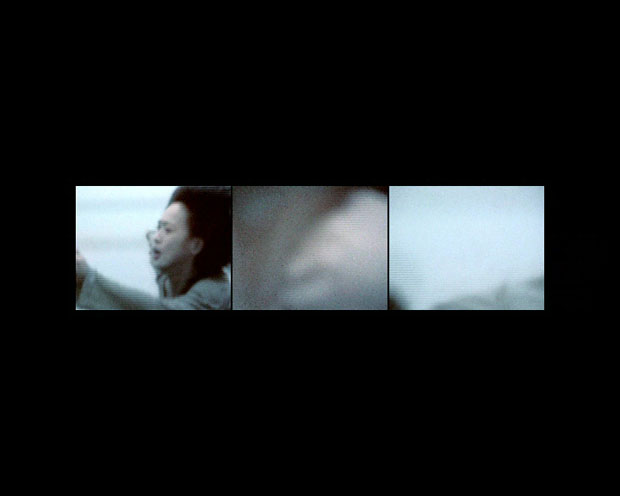
The Return, © R. Butcher 2005
I have set up an area of enquiry, in my written abstract, which begins with writing and ends with the interface where the operations of expert intuition, in performance-making by an expert practitioner, meet the operations specific to a logics of performance-production. I want to begin today by inverting that order, in order to profile expert signature practices, before moving on to tighten my writerly focus and to politicise it, in terms of the ways certain dominant practices in the university, both writing-based and performance-led, are widely accounted for by writers. Indicative of that accounting, in brief, is the formulation 'theory and practice', which separates these two out, with the term 'theory' in first place, and the term 'practice' second: my argument here is that this order of naming produces a particular order of things, rather than merely referring to one; a second indicative formulation is provided by our widely quoted friends, Foucault and Deleuze, both of whom use, in translation, the unproblematised couplet "discursive and non-discursive", which uses language as usual to bind mixed-mode practices in second place to discourse, while negativising the second term ('non-'). I am going to argue that expert practices are 'not-non-discursive' – unless, of course, you are a discourse analyst – which does not mean, however, that these expert mixed-mode performing arts practices are equivalent to discourse. Let's proceed, instead, to identify writing in Performance or Dance Studies registers as 'not-expert/professional performing arts practice'.
In order to focus on some of the problematic implications of these sorts of discursive ordering, and the conceptual ordering which this wording articulates, I want to start by bringing into play a question I put this year to the PARIP list, which is this: if much critical-theoretical writing in the university tends, in default mode, to be articulated from the position and according to the presuppositions of a spectator theory of knowledge, from which position and presuppositions performance-making practices are othered, where might we find the presuppositions and positions specific to an expert practitioner theory of knowledge? What might be the presuppositions specific to an expert practitioner theoretical enquiry?
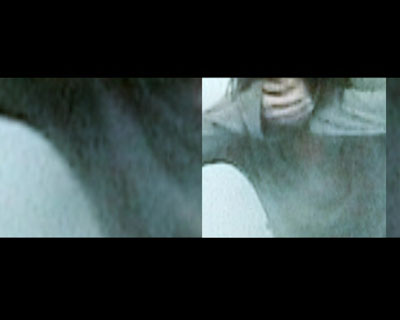
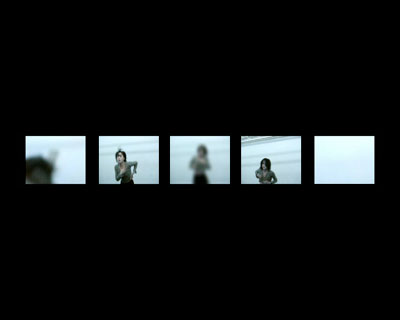
The Return
My second, linked question is apparently more contentious: why might it not be argued, while we are looking for an expert-practitioner knowledge-theoretical practice, that certain expert practitioners already articulate that expert practitioner theory of knowledge in and as expert practice? Central to this second question, however, is my suggestion that we reconsider exactly what we understand by the lexical item 'theory'. The term itself, in this nominalised form, reifies something; and that reification tends to cause many of us to overlook the possibility that 'theory' might actually be non-identical with, not coterminous or commensurable with, the writing which traditionally serves as its vehicle.
If whatever is understood by 'theory' were actually non-identical and not coterminous with the writing which conventionally serves as its vehicle, might it be possible to argue that some expert practitioners already theorise in multi-dimensional, multi-schematic and multi-participant modes, rather than in writing-dominant mode, just as it can be argued that some writers theorise in writing, but not others? My sense, here, is that the complex expert practitioner's mixed-mode theorisation tends to be invisible as such, to some of us who are expert writers, to the extent that it is our writing which is normalised and naturalised, and pursued to professional standards, within the university as major player in the economy of writing. My sense is that complex and creative mixed-mode performance-theoretical practices, where these are also driven in terms of the criteria by which performance professional practices are evaluated, are frequently mis-recognised, as such, by certain theoretical writers, as though they were 'merely practice'. I have also argued, elsewhere, that there is nothing quite so conventional as the clause itself, however 'radical' its thematisations might claim to be or appear.
Writing and spectator practices…
Once those of us who are expert/professional writer-educators entertain the notion that certain expert practitioners actually theorise in multi-dimensional mode, we might begin (it has not yet taken place) to identify how expert practitioners theorise, and what their disciplinary mastery enables expert performance-makers to theorise. To my eye, what expert performance-making, when it is driven by a philosophical imperative, as well as a creative and a professional imperative, cannot avoid theorising, is a particular take on performance composition itself. One example: what expert performance identified by writers as 'interdisciplinary' tends to theorise, in speculative mode, is the range and choice of particular compositional modalities. Indicatively, Rosemary Butcher's The Return, already theorises collaborative approaches to composition by practising them in the rehearsal, and by articulating the outcome of those interrogative processes, in the minute detail of her work, in terms both of available technologies, and in terms of professional imperatives. In the latter instance these different "process threads"(2) are articulated in performance modes specific to a particular situation in early 21st century Britain. They have already theorised – as we can see from the production choices made; these choices, by the way, bring with them, in systemic terms, the compositional options rejected. We need to say so, as writers, before we begin to attribute to such productions everything else – often of a thematic order – with which expert writer-educators tend to argue such productions are loaded.
What some of us who are expert spectators and writers choose, thereafter, to theorise more extensively in the practice of expert writing, seems to me to tend to have been arrived at through writing, and to be writerly, in compositional terms, as well as in terms of ethos. On this basis, it might be argued that they tend to emerge from and in terms of what others have called the 'communication fallacy', which supposes, erroneously, that choreographers seek throughout to communicate an already-existing message. My argument here, to the contrary, is that the writerly-theorisations which some of us who are, by definition, 'not-expert arts practitioners', proceed to produce, will tend to be spectator-positioned, spectating-informed, spectator-specific – hence seemingly a matter of visual culture. They are likely to be triggered when, as expert-spectator-writers, we seek to impress a range of interpretative apparatuses upon certain aspects only of what we perceive in the conditions of live performance – proceeding then as though these apparatuses were 'already there', rather than brought by some of us to 'the work' – and secondly as though they might enable us to 'explain' the work, rather than our own relationship to it.
Our spectator choices, to bring this or that writerly interpretative apparatus to the experience of performances, seem to me to be triggered whenever 'we' (by which I mean expert spectator-writers) seem to experience a (writerly) sense of empirical fit between spectator impressions, on the one hand, and already-existing writerly formulations which we bring to the work, on the other. Some of these already-existing writerly formulations, all of which are clause-based, can only be thought, rationally, using modernist critical models. By way of contrast, some other formulations, whose emergence will tend to precede and indeed to facilitate the impress of writing-based, rationalist premises onto our experience of the work, would seem to me to involve 'sensible intuitions' of the spectatorial kind. In my argument here, sensible intuitions, vital to the operations of spectating, seem to appear as though from nowhere, to be triggered economically rather than communicated as such, and in the case of performances, to operate in conditions specific to particular modes of experience of expert-spectating.
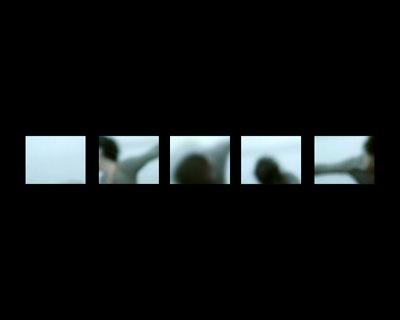
The Return
Recognition of the intermix apparently 'in the work', of what can be intuitively sensed, and what can only be thought, seems to me to require that some of us begin to identify 'the work' as internally self-varying. Certainly it can produce a double 'Aha!' moment in expert spectators, at one or another stage of spectating. But let's be clear: these apparent discoveries, or moments of privileged recognition, are impressed by spectating itself, upon certain aspects only of the spectator engagement with expert multi-modal practices. Such 'aspects' may well involve partial objects, which may be carried by concrete choreographic choices, rather than purposefully articulated 'by the work'. On this sort of basis, I am prepared to argue that they are not 'ex-pressed by' the choreographer at work, however much one or another spectator might seek to make that claim. I have used the term 'certain aspects' lightly, yet in professional practitioner terms, such 'aspects' may well have been retained in the work on the basis of the expert practitioner's own intuitive sensing, where they are equally subject to the expert practitioner's compositional mastery, and filtered through her own engagement with the logics of production which regulate the discipline.
From effects to causes
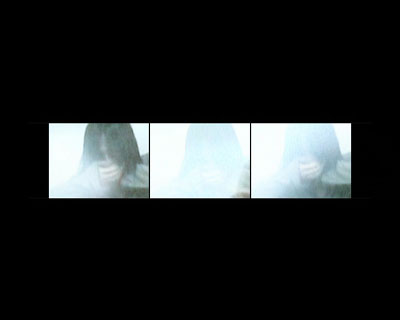
The Return
In most cases, writerly-interpretative apparatuses, brought by spectators, tend to engage with performance-effects, after the event, and in terms of the perceived disciplinary identity of that event, rather than with performance- making causes, which they are unable to predict (and unable, after the event, to prove). According to Rosenthal, such an engagement and spectator-productivity will be encouraged, in the university at least, to employ formalised deductive models "of scientific explanation that allow for verification by operations of testing". These deductive models are limited, however, in that they cannot grasp or "deal with any process by which ideas are generated"(3). As writer-spectators, we tend to have access only to effects/affects triggered by 'something' in the work, but re-activated by us, thereafter, not only as a springboard into some of the complexities of writing in certain approved disciplinary-specific registers, but as the basis for a retrospective claim as to causes we tend then to attribute to the practitioner and/or the 'context' – a splendidly vague term, this one, used with apparent blithe abandonment, even by writers who should know better. This is a time-honoured and university-specific writerly activity, and we might have to accept it as such, at least wherever its operations are transparent.
Where my particular problem emerges, is wherever some of us who are expert spectator-writers seek to attribute our secondary theoretical (writerly) practices either to the practitioner, or to her expert practices, or to a supposedly 'enabling context', or to a particular situation, or to a combination of the four. The 1990s typical formulation which ran along the lines that 'as a feminist Bobby Baker is critical of…', is a pure invention of expert-spectating, trained and normalised under the heading of Performance Studies, or Dance Studies, in writing-productive sites in the university. It misrecognises agency, as well as the role of the practitioner-subject and what she knows. Moreover, such a written formulation is already-backward-looking at the moment of its production, whereas in my experience of expert practices, the practitioner herself tends to be forward-looking – which means that these two modes of production are out of sympathy with each other, fail to achieve empirical fit.
My own observation, in the postgraduate teaching context, is that performance-writing of this pre-ordained ("scriptural"(4)) kind is triggered for some spectators, in the performance-relation, by the operations of hypotyposis, where something perceived in performance, from a spectator position, can seem, in Paul de Man's words, to "make[…] present, to the [spectator's] senses, something which is out of their reach, not just because it does not happen to be there but because it consists, in whole or in part, of elements too abstract for sensory representation"(5).
"…too abstract for sensory representation"
What might be the compositional nature of these "elements too abstract for sensory representation"? In the work of Rosemary Butcher, we might call the combination of these sub-semiotic elements 'atmosphere', or 'ethos'; we might find ourselves talking about the way her work 'takes the pulse of' 'something in the air', a nebulous but resonant notion, which seems to me to aspire to and fail at naming particles and compositional strategies and tactics at the same stroke. My sense – and I can be no clearer than this – is that the expert practitioner is fully aware of, but will not have discursivised, this sort of particulate 'sewing' and 'strewing', which Rosemary Butcher undertakes at the interface where available technologies engage with an ongoing process of philosophical speculation and aesthetic enquiry, and will bear her signature. She may well not attribute to it what others seek to attribute, but that is because différance remains, wherever we are concerned with relationality, with the differences between making and perceiving 'new work', and with the different perceptual processes involved when we engage with the work from within or from without it.
It is at this complex and dynamic interface (dynamic because it keeps shifting and reformulating itself, as technological input changes), and what it enables her to produce, which drives her to make new work, in terms specific to one or another compositional tradition – as dance, for example, or as screen dance, or as visual art. My assertion here is that the artist, in the cases which interest some of us (in the university), is actually herself engaged in a complex epistemic enquiry, in which terms the 'new work', which looks briefly back at her, functions as a momentary and incomplete instantiation, which bears her signature. According to certain writers, epistemics as a disciplinary practice was established "at Edinburgh University in 1969 with the foundation of a School of Epistemics". The term signals "the scientific study of knowledge as opposed to the philosophical theory of knowledge, which is known as epistemology. A more extended definition of epistemics is 'the construction of formal models of the processes – perceptual, intellectual and linguistic – by which knowledge and understanding are achieved and communicated'"(6).
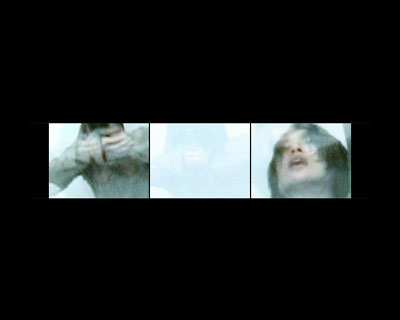
The Return
To come back to performance perceptions, in the hands of expert spectators, and their recourse to already-formulated interpretative apparatuses, and to the writing this alliance produces: these expert interpretations will seem to expand, to include "something[s] out of their reach, not just because they do not happen to be there ['in' the strong lines and the minute detail of the performance composition], but because these expanded complexities will tend to consist, in whole or in part, of "elements too abstract for sensory representation". I have already identified a few of these: one is 'signature', another is 'context', a third is 'atmosphere', a fourth is 'self', or the identity of one or another subject of expert performance-making. In Butcher's work of which moments are quoted here, one further vivid sketch or set of sketches, which require (in performative terms) that a viewer attempt to complete them, is 'the dancer as collaborating artist'. (Dance Studies can readily overlook a number of these, not least the signature of the dancer as collaborative artist; or it identifies them as given, rather than subject to analysis.)
The performance-making apparatuses, by way of contrast, given the long-term and ongoing compositional experiment the work undertakes, the rules it has applied to it, and the theorisation it undertakes in the making of it, work to different logics, to different 'knowledge-models', to different imperatives, target different ends. Central to these, in this instance, is the developing collaboration of Rosemary Butcher, Eun-Hi-Kim, as dancer, and the film-maker, Martin Otter, and the ongoing, prudent negotiation, led by the choreographer-artist, with qualitative transformation in mind, with each of these collaborators. That this collaborative negotiation has been realised, can be identified 'in the work', albeit imperfectly; how it was realised, however cannot be seen, even though what it entails were expert interventions specific to the choreographic artist's mastery. Yet aside from those still concerned with the notion of inter-disciplinarity, this sort of collaboration is rarely explored by the spectator-analyst. Plainly the latter cannot see making-processes, from her seat in the audience; can only infer these, on the basis of 'the evidence'. I have already argued elsewhere that a spectator, constitutively, can only see what she can see…(7)
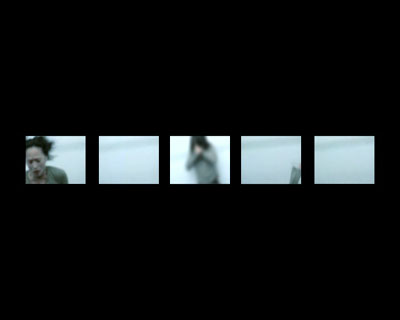
The Return
These sorts of collaborative and signature-specific, professional interventions may well operate according to what the Kantian tradition has called "symbolic exhibition"(8). The performance-compositional strategies specific to "symbolic exhibition" enable expert practitioners, working collaboratively, and thinking in multi-dimensional, multi-schematic, multi-participant modes, to "use…an [interface] analogy…in which judgement performs a double function":
- first, a conceptual order (e.g. looking intensely and interrogatively at human touch) is reorientated in terms of a particular objective (e.g. making new work), and is applied, using the compositional tools available to the expert practitioner (e.g. expert dance practice + digital film-making + electronic sound), to the "objects of a sensible intuition" – which she may have been surprised by, as though in a flash coming apparently from a nowhere of rational enquiry(9);
- she captures it, and reflects on it;
- thirdly, she "applies the mere rule by which [she] reflects on that intuition, to an entirely different object".
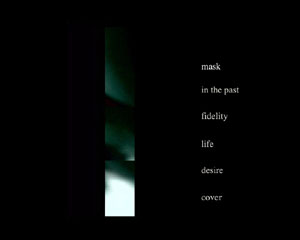
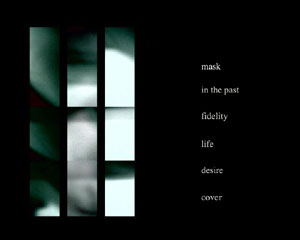
The Return
The 'new work' begins, thereby, to emerge, at (indeed as) the interface (which is dynamic, potentially unstabilised, and singular) between conceptual order, disciplinary specifics, 'objects of a sensible intuition', and the 'mere rule by which she reflects on that intuition', applied to an entirely different object. In collaborative practice, we need to multiply aspects of this set, if not the full set, a number of times over, in order to begin to grasp the complexity but also the different perspectives specific to collaboration. This "entirely different object"(10) – the 'new work', as it appears – will surprise the makers, who literally could not, individually, have imagined 'it'.
The signature practitioner's engagement, in this complex process, operating in multi- dimensional, multi-schematic, often multi-participant mode, combines the expertly sensed, the expertly intuited, with 'what can only be thought', and with those rules through which a disciplinary practice, or collaborative practices, are identified as such. We might view these processes either as stages, or phases, or, indeed, as involving and bringing together different process threads. What interests me, at this point, is the sense I have, which is that each of these stages will be involved, if not necessarily in the order I have borrowed above, in expert practices; but that none of these necessarily draws on written or writing- like discursive constructs – not even when what is concerned is a matter of the operations specific to the logics of production or the production values specific to the given field of experimentation and invention. They are brought into productive interface, in other words, in terms of her own, long-term, and continuing productivity, in terms of her own epistemic project.
Expert (creative, professional) practice as epistemic
My use of the term "epistemic" here refers to an ongoing research enquiry, in speculative mode, affectively invested, in which terms 'the production' – which is what the expert spectator normally has available to her – is no more than one momentary instantiation (11). That momentary instantiation, according to practice theorist Knorr-Cetina, will tend to be experienced by a spectator as the 'thing itself', but it will tend to be experienced by the expert practitioner-researcher in question as incomplete, as non-identical with her own larger epistemic enquiry, which will drive her to make yet another new work. In Knorr Cetina, epistemic practices are "knowledge-centred practices", which are "any …objects of investigation that are at the center of a research process and in the process of being materially defined" (181). These epistemic practices are characterised by
a lack of completeness of being, that takes away… the thing-like character [objects have] in our everyday conception… [O]bjects of knowledge appear to have the capacity to unfold indefinitely [and] continually acquire new properties and change the ones they have.
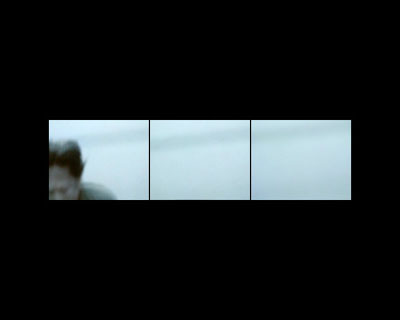
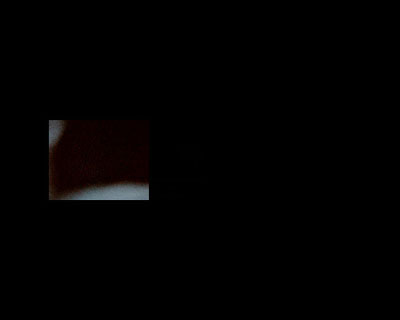
The Return
I have been brooding, on the way to my interim conclusions, on something I recently intuited, under the heading "Words Fail Me" (S. Melrose, Keynote Address, at the Performance Research Centre, University of Aberystwyth, April 2005), which is that certain notorious theoretical writers themselves, working in the later 20thC, have actually developed their own theoretical insight on the basis of expert intuitions, before they proceed to recuperate these in terms provided by conventional research methodological procedures which some of us are encouraged to teach in the university. These are writers whose disciplinary focus itself tends to trap them at the interface between writing and the radical outside of writing, where that radical outside of writing is particularly complex, multi-dimensional, multi-schematic, and multi-participant – in Steven Pinker's terms, entailing "something peculiarly holistic and everywhere-at-once and nowhere-at-all and all-at-the-same-time"; its complexities are such as to test even the greatest "compositional [and] combinatorial abilities"(12) of the human mind.
At that particular interface, I would argue that it is less likely, in the first instance, to be rational argument, rather more likely to be expert writerly intuition, through which these expert writers experience insight – even if it is the case that what it enables them to produce next, tends to be processed through the structures of critical argumentation. Two examples which should be very familiar to many of you illustrate what I mean here: Bourdieu, writing from within French Leftist sociology and cultural theory in the 1970s and after, has expertly intuited something he called "habitus" as an individualised but economically-determined causal mechanism of class-specific cultural production, visited upon the individual. (How curious, by the way, that intuition is poorly treated, as such, by this expert writer, rarely identified in the index to his published writing.)
"Habitus", as many here will be aware, involves a "durably installed generative principle of regulated improvisations"(78), "laid down in each [of us] by his [or her] earliest upbringing"(81); it entails "the harmony of ethos and tastes", and relates to "the dispositions of those whose aspirations and world-view they express"(13). Given the extent to which these are abstractions from the material, are as such unable to be evidenced and are dependent then on insight coupled with inference, my argument is that Bourdieu has been obliged to intuit habitus, as a trope, to allow him to seem to deal with a gap in authoritative writing about the materially-grounded social order. In these sorts of terms, habitus is inventive, revealing expert insights linked to logical inferences, and projected back onto his own careful and sustained observation of social effects.
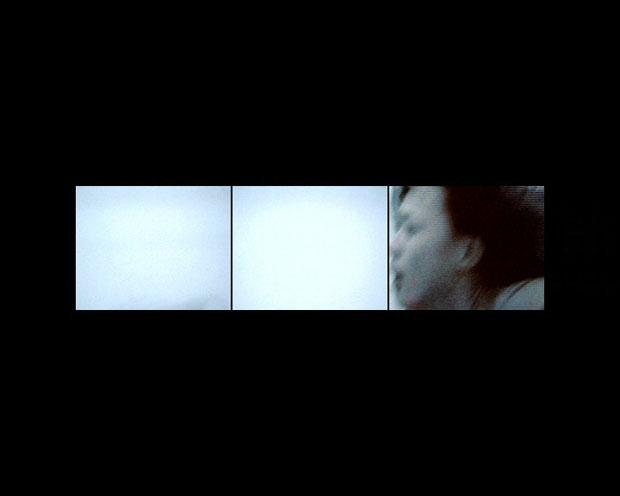
The Return
"Habitus", from this perspective, is a trope, conjured to cover over a gap in reasoning and a gap in material evidence. And "habitus", in the terms I have used earlier, functions now as something like a vivid and highly economical word sketch, liable, when its performative function is taken on board by a reader, to "make[…] present, to the [reader's] senses, something which is out of their reach, not just because it does not happen to be there but because it consists, in [significant] part, of elements too abstract for sensory representation". Habitus emerges, from this perspective, as a sensible intuition, to which Bourdieu brings both a conceptual order and a set of academic-writerly rules, to the end of identifying or producing a third entity: a theoretical account (or more modestly, an 'outline of a theory') of practice. Observed behaviour in its complexity, on this basis, can be construed, in part at least, as an effect of (and affectively linked to) habitus. Let's not suppose however, on the basis of Bourdieu's careful wording that follows his invention, that habitus is anything other than a creative invention, the outcome of a skilled writer's expert-intuitive leap.
My second example of an expert-writer intuition, produced once again from that interface where the writer and his writing contemplate the complex outside of writing, is Frederic Jameson's borrowed trope "cognitive mapping", which serves once again, through the operations of hypotyposis, as "a situational representation on the part of the individual subject to that vaster and properly unrepresentable totality which is the ensemble of society's structures as a whole"(14). For Jameson, "cognitive mapping" would be linked to "that mental map of the social and global totality we all carry around in our heads in variously garbled forms" (my emphasis). Now, "cognitive mapping", in the 1990s, given the then-existing state of knowledge of a neuro-cognitive kind, could only, once again, have been intuited, by an expert spectator-writer, imprisoned at that particular interface between writing and the complex multi-dimensional outside of writing, and recuperated, thereafter, in writing.
In place of a conclusion
As such, and I shall end here, notorious theoretical writers' intuitions, their intuitive leaps and uses of metaphor, when they are confronted, from within writing, by the complex multi-dimensional, multi-schematic, and multi-participant outside of writing, would seem to come from a nowhere of research methodological enquiry. Whence my final question: when and where might we go, if we are concerned, from within the university, to demonstrate that the most complex of expert performance-practitioners already theorise multi-dimensionally and multi-schematically, if it is also the case that the most inventive theoretical writers, in order to seem to make progress in their disciplinary fields, take creative and imaginative, intuitive leaps in order to develop their theoretical agendas?
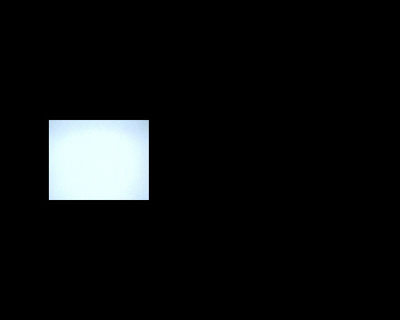
The Return
From this point of view, neither expert practitioner nor theoretical writer, if I my hypotheses are correct, stereotypically 'theorises', at those moments when conventional ways of knowing are revealed to be inadequate to the knowledge-task confronted. Each leaps, intuitively, into a nowhere of expert writing, on the basis of a sense that something might match something else, might momentarily achieve empirical fit with its other – for long enough for new insights to be developed. These new insights, let's be clear, are even more likely to emerge in the new work of Rosemary Butcher, than they are likely to be provided in terms of one or another later 20thC critical-theoretical writerly trope. Let's say so.
Endnotes
1. This title (and presentation) is dedicated to all of those professional practitioners I have met, who tend to load their own account of their expert processes with that qualifier "just…", which I have described as an indice of professional-practitioner abjection.
2. The term is Brian Massumi's, from his Parables for the Virtual: Movement, Affect, Sensation, Duke University Press, 2002
3. S. Rosenthal, Speculative Pragmatism, Open Court, 1990: 9-10
4. the term as I use it here comes from Michel de Certeau, The Practice of Everyday Life, trans. S. Rendall, University of California Press, 1984
5. Paul de Man, in Sheldon Sacks, ed., On Metaphor, University of Chicago Press, 1979
6. A. Bullock et al (eds), Fontana Dictionary of Modern Thought, Harper Collins 1977
7. see, for example, Melrose, S (2003) "The Eventful articulation of singularities…"
8. Immanuel Kant, Critique of Judgement, translated and edited by W. Pluhar, Indianapolis and Cambridge, Mass: Hackett Publishing Company,1987
9. yet it involves activity in quite specific brain sites, whose activation can be recorded – see Calvo-Merino, Haggard et al on fMRI scanning carried out at the Royal Ballet, London: Calvo-Merino, Haggard et al, "Action Observation and Acquired Motor Skills", Cerebral Cortex, Dec 2004
10. Kant/Pluhar ibid
11. K. Knorr Cetina, "Objectual Relations", T. Schatzki et al, The Practice Turn in Contemporary Theory, Routledge: London and NY, 2001
12. S. Pinker, The Blank Slate: The Modern Denial of Human Nature, Allen Lane 2002
13. P. Bourdieu, Outline of a Theory of Practice, trans. R. Nice, Cambridge University Press, 1977:78-82
14. F. Jameson, Postmodernism, 1991, 51
Background image from The Return, © R. Butcher 2005. Web design copyright © John Robinson.
Page last updated 28th June 2015.